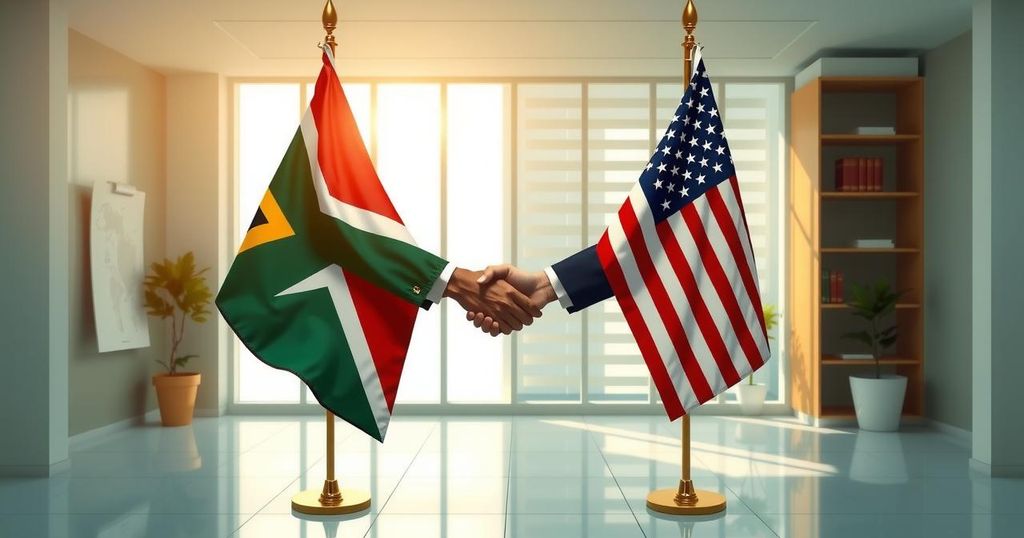South Africa: Navigating a Tense Diplomatic Meeting with Trump

South African President Cyril Ramaphosa is meeting President Trump amidst rising tensions due to U.S. aid cuts and claims of ‘white genocide’ affecting Afrikaner farmers in South Africa. The meeting is significant as it is the first engagement between Trump and an African leader since his return to office in 2025, with substantial economic implications for both nations.
This week, South African President Cyril Ramaphosa is set to meet with U.S. President Donald Trump at the White House. They’re looking to discuss several key topics, each pivotal in modern diplomatic relations. However, rising tensions complicate this first meeting between Trump and an African leader since his return to the presidency in January 2025. Issues like U.S. aid cuts and Trump’s controversial views on land reform in South Africa have created a charged atmosphere.
Tensions between the two administrations have escalated, particularly against the backdrop of Trump’s repeated claims of “white genocide” affecting Afrikaner farmers in South Africa. Musk’s controversial asylum proposal for these farmers adds a layer of complexity. The South African government firmly asserts that there is no evidence to back up claims of genocide or persecution against Afrikaners. Many of these farmers’ organizations, including AfriForum and the Solidarity Movement, have publicly rejected the U.S. asylum offer and emphasized their desire to stay and solve their challenges domestically.
Elon Musk’s influence has cast doubt on the ongoing discourse surrounding South Africa. His AI chatbot, Grok, has been accused of pushing misleading narratives about white Afrikaners while responding to unrelated topics on X (formerly Twitter). Critics are concerned that this technology propagates incorrect narratives, contributing to misinformation campaigns about the socio-political situation in South Africa. Notably, journalist Qaanitah Hunter underscored the dangers of such misinformation.
From an economic perspective, Trump’s policies have inflicted significant damage on South Africa. His executive order halting aid to the nation was justified by claims of unfair property policies. This has dire consequences for public health programs, notably HIV and AIDS initiatives that depend heavily on U.S. support. With a sizable portion of this budget now uncertain, South Africa’s efforts in combating the disease face a potential setback.
Trade dynamics are precariously positioned as well. Earlier tariffs imposed by the U.S. on South African imports, alongside a notable jump in vehicle tariffs, have drawn anger from Ramaphosa’s administration. The development of the AGOA (African Growth and Opportunity Act) status still looms over these discussions, as its renewal could be pivotal for both economies involved.
The upcoming meeting between Ramaphosa and Trump is seen as crucial, particularly as it precedes the G20 Summit in Johannesburg where South Africa aims to assert its leadership for developing nations. However, Trump’s suggested boycott of the G20 raises doubts about the U.S.’s commitment to furthering relations with South Africa and complicates diplomatic engagements.
Political analysts are closely watching the U.S.’s motives, especially given its international stance on issues such as support for Israel and its strategic alignment with other global power players. The complex web of relationships places South Africa in a balancing act, especially when considering its ties to BRICS nations.
Minister Ntshavheni has indicated that the South African government approaches this meeting with optimism, expecting concrete discussions rather than symbolic dialogue. Still, given the contentious backdrop of land reform issues, trade tensions, and broader global alliances, outcomes may be fraught with difficulty as both leaders look to address key matters that affect not just their countries, but international relations as a whole.
The upcoming meeting between President Ramaphosa and President Trump is set against a backdrop of significant tension and economic uncertainty. The discussions will navigate delicate matters like land reform, U.S. aid cuts, and trade tariffs, pivotal issues impacting South Africa’s socio-political landscape. As the relationship evolves, the diplomatic outcome of this meeting will likely influence both nations’ future interactions, especially regarding international collaborations like the G20 Summit.
Original Source: allafrica.com







